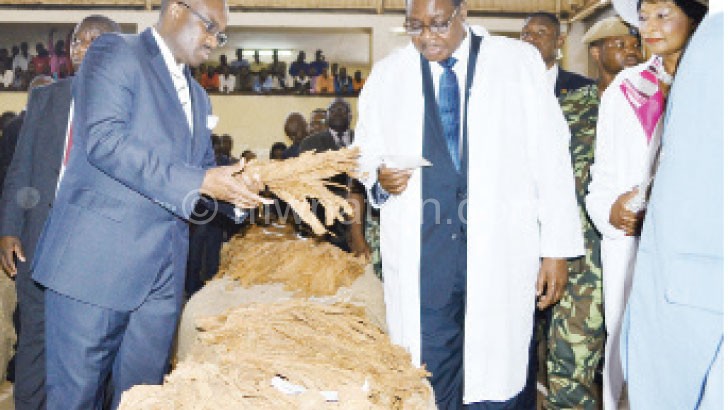New label system irks tobacco growers
When Malawi tobacco growers embraced a new way to show pride in their product through a new bar-coded label sticker courtesy of the Integrated Production System (IPS), they rejoiced. Little did they know that the new label system will come back to haunt them.
The bar-coded labels for growers under IPS or on contract were introduced to ease congestion, tracking and processing of tobacco. The introduction involved dumping the old manual rectangular green and pink cards for a computerised labeling. Barcodes are designed for computers to read quickly by scanning red LED or laser light across them.
However, tobacco growers now say they are struggling to get these new bar-coded labels from the tobacco buyers in time.
In the past the labels were being issued by the Auction Holdings Limited (AHL Group).
However, starting from this year, some buyers have opted to do the labeling themselves.

Growers in Mzuzu told Weekend Nation that some buyers have failed to issue the new bar-coded bale labels in time, a development that has delayed growers to sell their crop.
They say such delays have directly impacted on loan repayments as interest on loans has accumulated.
Growers’ representative body, the Tobacco Association of Malawi (Tama) confirmed having received growers’ complaints.
“We have been receiving various complaints from our members, one of them being the delay in accessing [bar-coded] labels to sell their crop. These labels are scarce and farmers were not communicated of the new system of marketing their leaf,” said Graham Kunimba, Tama chief executive officer.
In an interview, AHL Group corporate affairs manager Mark Ndipita said the new barcode label system has brought confusion among growers who do not understand the system.
“As AHL Group we are aware that farmers are encountering challenges because of the bale labels introduced by some merchants this year. For instance, growers are complaining that the bale labels are being sold to growers at exorbitant prices by some merchants.
“Farmers under IPS and those on contract under non-funded are also facing loading challenges due to scarcity of bale labels from merchants in some areas,” he said.
But two of the country’s major tobacco buyers, Alliance One Tobacco-Malawi (AOI-MW) and JTI Tobacco Limited, said it was incorrect to blame the buyers.
AOI-MW corporate affairs manager, Francoise Malila said her company gave most of its growers the bar-coded tickets in good time.
“The statement about there being a delay is incorrect as AOI MW is in fact two weeks ahead of farmer loan repayment against the same period last year. In order to ensure AOI MW contracted IPS farmers are, as per contracted agreement, able to bring in their tobacco in a systematic manner, contracted farmers have been given tickets on when to bring in their tobacco to the marketing floors, to avoid congestion and delay in off-loading their tobacco thereby incurring higher costs,” said Malila.
Malila said the reduction in farmers take home cash is not due to delay in paying back the loans.
“Interest accounts for four to five percent of costs. Price paid is dictated by market supply and demand. The current market is in an oversupply condition especially for burley tobacco,” she said.
She said AOI MW has this year adopted a staged approach by issuing the labels in three phases to give equal opportunity to farmers to sell their crop proportionally.
While JTI Leaf Malawi Limited corporate affairs and communications director Antonio Vencesla said his company has not experienced any challenges with the labelling system.
“The labels are provided at the farm according to the number of bales that a grower is expected to have, based on the volume and hectares agreed in the contract. Therefore, we give one label per bale,” said Vencesla.
He said all JTI contracted growers received their labels in time.
Vencesla added that the company charges a flat rate, hence, any delay cannot have an effect on the loans.
Currently Malawi which depends on tobacco as its major export has sold 92.4 million kilogrammes (kg) of the leaf, raking in $143.5 million at an average of $1.55 per kg. n





